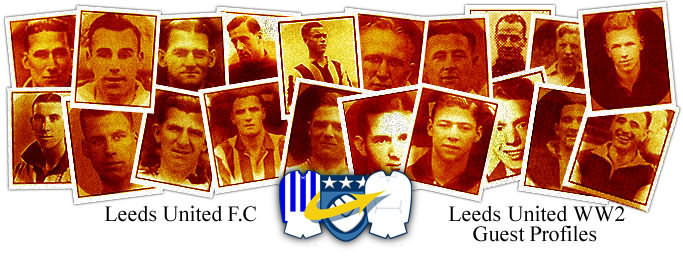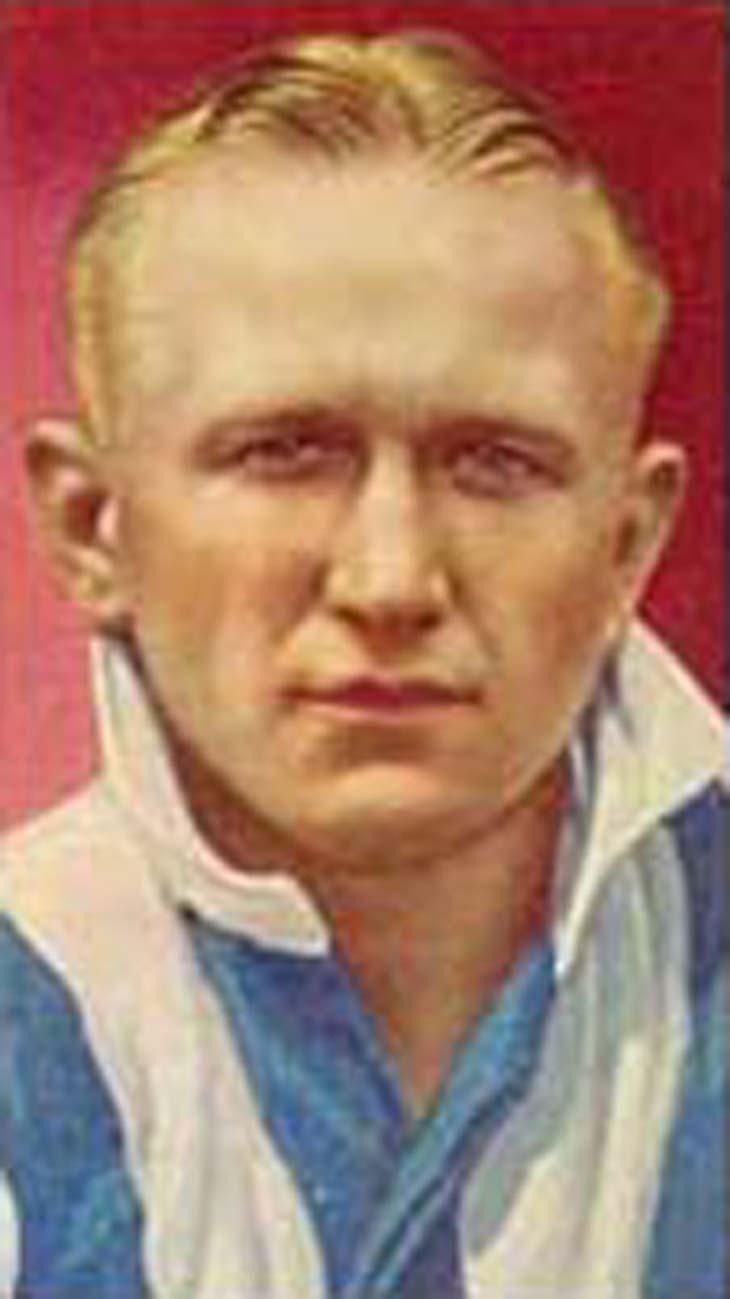

Boyes: Walter Edward (Wally)
WW2 Guest: 1942-1944
(Leeds United War-time Guest Player Details)
Outside Left
Born: Killamarsh, North East Derbyshire: 05-01-1913
Debut: v Bradford Park Avenue (h): 03-04-1943
5’4” Weight: Unknown (1939)
Boyes started his football with the Sheffield Boys team before playing with Woodhouse
Mill United in the Sheffield area. He joined West Bromwich Albion in February 1931 and
initially played as a Left Half, but gravitated to Outside Left. He became a regular in the
Baggies team and had the ability to play in several positions with ease over the years.
However, it was as an Outside Left that he was best remembered and it was in that position
that he got his three England Caps. The first of which came while he was at the Hawthorns,
on 18th May 1935 in a 1-0 win over Holland at the Olympic Stadium Amsterdam. 1935 was a big
year for Boyes as he scored twice in the seven games as the Baggies reached Wembley in the
F.A. Cup Final. They beat Port Vale 2-1, then Sheffield United 7-1, Stockport County 5-0 and
Preston North End 1-0 at the Hawthorns, before coming up against Bolton Wanderers in the
Semi-Final. Then, after drawing 1-1 at Elland Road, they went through with a 2-0 win at the
Victoria Ground, home of Stoke City. Unfortunately there was only a losers’ medal for Boyes
as the team he supported as a boy, Sheffield Wednesday, triumphed 4-2. He did, however,
score the Baggies’ first goal, which was acknowledged as one of the finest seen in an F.A.
Cup Final. With West Bromwich trailing 0-1 after twenty-one minutes, the diminutive Boyes
who, at twenty-two, was the youngest player on the pitch, received the ball inside his own
half fromTed Carter, who was a limping passenger. Boyes set off on a run that took him almost
half the length of the field before rifling a rising drive into the net for a sensational and
spectacular equaliser. He was with West Bromwich Albion for seven years, leaving them for
Everton in February 1938. He had played one hundred and fifty-one League games and scored
thirty-five goals, twenty of which had come in the 1934-35 season when he was at his most
prolific. He had also scored three goals in fourteen F.A. Cup appearances, half of which had
come in the same 1934-35 season. He signed for Everton for a fee of £6,000 and made his
debut for them on 28th February 1938 in a pulsating 4-4 draw at Elland Road against Leeds
United. He won back his place in the England team, playing twice in quick succession, both at
Outside Left, in a 4-2 defeat by Wales on 22nd October 1938 at Ninian Park and then in the
prestigious 3-0 victory over the Rest of Europe at Highbury four days later, to complete his
collection of England Caps which ended at three. He did, however, play twice for the Football
League. He had scored seven goals in forty-nine League appearances and four goals in five
F.A. Cup ties for the Goodison Park club before World War Two brought the Football League
Fixtures to an end for the duration of the War. He had contributed four goals in thirty-six
games towards establishing Everton as the Football League Champions for 1938-39 to gain
himself a medal in the last completed season before the War. He, like so many other gifted
players, was at the height of his career and could only muse what might have been in store
for him in honours, medals and International Caps, had not hostilities restricted his career.
He was one of several professional footballers who became Physical Training Instructors at
Aldershot for the Army, others included his Everton team-mates, Joe Mercer and Tommy Lawton,
and Leeds United player, Eric Stephenson, and former Leeds player, Bert Sproston. It was
during the war years that he guested for Leeds United. He did play more often than most such
guests and first wore the Blue and Old Gold in the final two games of the 1942-43 Football
League Northern Section (Second Championship) season when he played consecutive games in a
2-0 win at home and a 2-5 defeat away against Bradford Park Avenue at Outside Left. He
followed this up with four goals in fifteen out of a possible eighteen games in the Football
League Northern Section (First Championship) in the 1943-44 season, and four more goals in
thirteen of a possible eighteen games in the Second Championship tournament in the same
season. He also guested for other clubs including: Aldershot, two games in 1943-44 and one
more in 1944-45, without scoring. Similarly, there were no goals when playing for Brentford,
two games in 1942-43. Clapton Orient, five games in 1942-43. Manchester United, one game in
1944-45, Middlesbrough, two games in 1941-42, Millwall, two games in 1942-43, Newcastle
United, two games in 1941-42, Preston North End, one in 1944-45, Wrexham, one game in
1944-45. However he did score once in three games with Sunderland in 1942-43. He did also
guest for his own club Everton and was quite prolific when playing on a regular basis.
There were six goals from twenty-five games in 1939-40, four goals from thirteen games in
1940-41, three goals in thirteen games in 1941-42, but no goals from five games in 1942-43
and three games in 1943-44, then three goals in seventeen games in 1944-45 and twelve goals
in forty-two games in 1945-46. He resumed playing with Everton after the War, but was no
longer a regular, scoring four goals in seventeen League games and two F.A. Cup ties before
leaving to become Player-Coach with Third Division South team NottsCounty, along with his
Everton and England team-mate Tommy Lawton, with whom he had formed a perfect understanding
and goal-scoring formula. His playing days were nearing their end and he only scored once,
in a 3-1 win over Port Vale on 7th April 1950, in three games, as the Magpies ran away with
the Third Division South Championship and gained promotion to the Second Division. He joined
Scunthorpe United in August 1950, scoring twice in thirteen League games as their
Player-Trainer and Inside Right but there was no promotion for them as they finished twelfth
in the Third Division North. After that he moved into Non-League with Retford Town in 1954,
where he was Player-Manager, and finished his playing career with Hyde United, who he joined
in 1958. Boyes also worked as a sports teacher at Oakwood Collegiate School from 1952 to
1958. He became Trainer of Swansea Town in 1959 but retired due to ill-health in May 1960.
He died on 16th September 1960 at the early age of forty-seven.